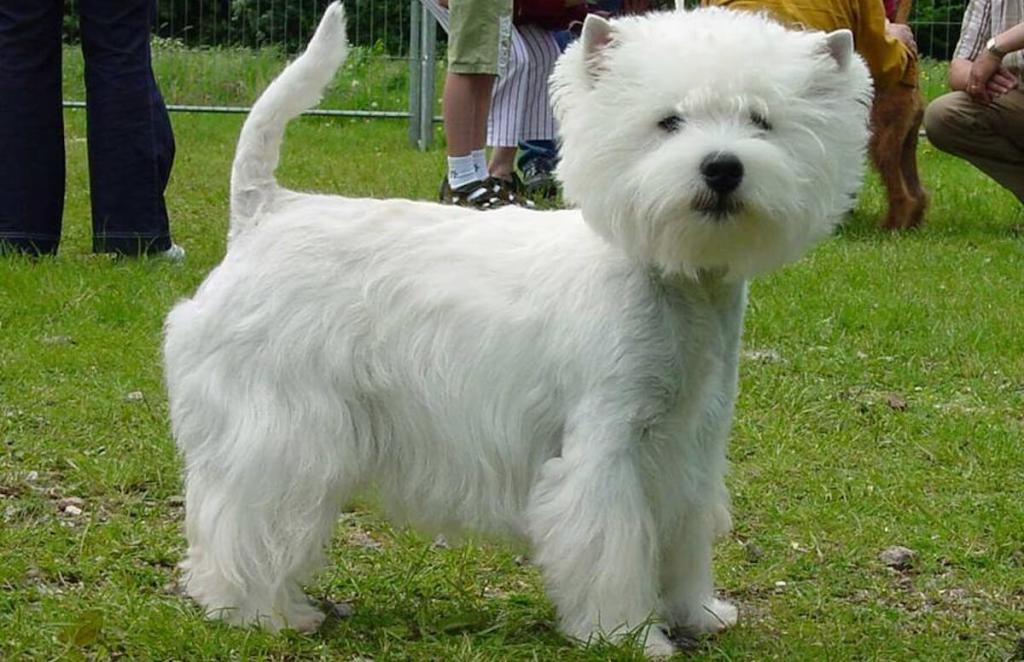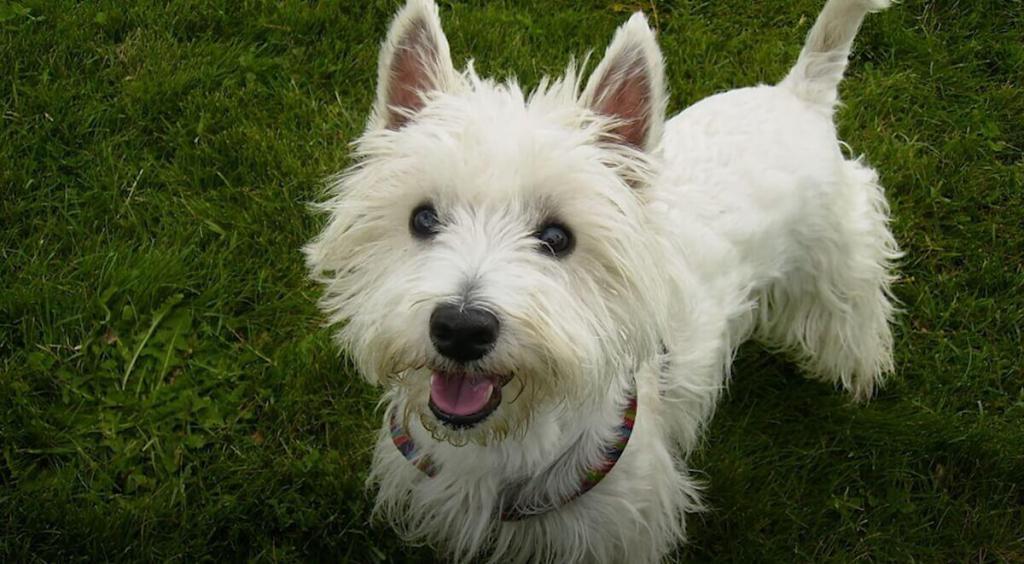You might think a West Highland White Terrier, with its snowy fur and button eyes, could do no wrong, but beneath that adorable exterior lies a feisty spirit that could rival any heavyweight champion. As you consider adding a Westie to your life, it’s crucial to understand the dynamic traits and temperament that define this breed.
Known for their independence and confidence, Westies are more than just lap dogs; they’re sturdy little characters who prefer adventure and a streak of stubbornness that can challenge even the most seasoned dog owners. Their boundless energy and sharp wits demand an owner who can provide firm, consistent training from puppyhood.
But when you think you’ve got them figured out, they’ll surprise you with their affectionate and loyal nature, ensuring that life with a Westie is never dull. Stick around to uncover how these pint-sized powerhouses can capture your heart and what it takes to keep them happy and thriving.
- Noise Level
- Energy
- Sociability
- Trainability
- Care
- Health
Overall
Summary
The West Highland White Terrier is known for its moderate noise level, high energy, strong sociability, decent trainability, moderate care requirements, and good overall health.
West Highland White Terrier: Traits, Temperament, and Care Guide
Embarking on a journey with a West Highland White Terrier, commonly known as a Westie, demands an understanding of their robust personality, innate stubbornness, and the attentive care required to nurture their well-being.
Possessing a true terrier temperament, they exhibit intelligence and independence, making training challenging and essential. These dogs require early and consistent socialization to mitigate tendencies toward excessive barking, digging, and potential aggression with other dogs.
Your Westie’s hardiness is matched by their need for regular mental stimulation and physical exercise to prevent boredom-induced behaviors.
Addressing health issues prevalent in the breed, such as certain genetic conditions, necessitates vigilant grooming and dental care to ensure a quality life for your companion.
Exploring the Characteristics of the West Highland White Terrier
Diving into the West Highland White Terrier’s characteristics reveals a breed marked by its spirited nature and inherent tenacity. It demands consistent training to harness its intelligent yet willful disposition. As a Westie owner, you’re embracing a dog whose traits and temperament blend affection with an aggressive streak. They’re independent thinkers and can be obstinate, so you’ll need to be patient and persistent in their training.
Here’s a quick overview of the West Highland White Terrier’s key characteristics:
| Aspect | Description |
|---|---|
| Intelligence | Smart, capable of learning complex commands |
| Independence | Self-sufficient, may challenge authority |
| Socialization Need | High, to prevent territorial and protective behavior |
| Health & Grooming | Requires regular care, prone to specific health issues |
West Highland White Terrier: A Comprehensive Profile and Guide
You’re considering the West Highland White Terrier, a breed defined by a unique blend of traits that demand an owner’s understanding and commitment.
This guide presents a comprehensive profile, equipping you with the facts to assess if a Westie aligns with your lifestyle and expectations.
Considering their robust personality, grooming requirements, and exercise needs is crucial to ensure a harmonious relationship.
Everything You Need to Know
Understanding the West Highland White Terrier begins with recognizing its distinct personality, characterized by independence, intelligence, and self-confidence. This comprehensive profile guides you through the key traits and temperament that define a Westie.
- West Highland White Terrier Breed Profile
- Origin: Scotland; bred for hunting and rodent control
- Size: Small but sturdy; typically about 10-11 inches tall at the shoulder
- Coat: Double-coated; pure white fur is a trademark
- About the West Highland White Terrier
- Lifespan: Generally healthy with a lifespan of 12-16 years
- Grooming: Requires regular brushing and occasional trimming
- Exercise: Energetic; needs daily activity to maintain fitness and mental health
- West Highland White Terrier Personality
- Independent: Happy to explore and play solo
- Intelligent: Quick to learn; responds well to training
- Self-confident: Fearless attitude; can be assertive with other animals

Discovering the Temperament
When exploring the temperament of West Highland White Terriers, it’s essential to consider their intelligent yet stubborn nature, which can influence their trainability and interaction with other pets. These traits, inherent in the Westie, necessitate a firm yet affectionate training approach to harness their potential.
Their penchant for excessive barking and digging requires early intervention to foster harmonious cohabitation. As hardy and long-lived dogs, Westies thrive with consistent socialization and sufficient physical and mental engagement.
Their adaptability to apartment living and various climates and their capacity to endure solitude make them a viable option for novice owners. Ultimately, the Westie’s affectionate disposition renders them a charming companion, integrating seamlessly into familial settings and affirming a sense of belonging.
West Highland White Terrier: Is It a Good Fit for Families?
You may wonder if the West Highland White Terrier needs consistent socialization and stimulation and is an optimal choice for your family. Considering their high energy and requirement for daily exercise, Westies demand an active household that provides ample affection and entertainment in return.
Their compatibility with children and other pets enhances their suitability for family integration, yet their potential for genetic health issues necessitates a commitment to ongoing veterinary care.
Assessing West Highland White Terrier’s Compatibility with Families and Kids
Although West Highland White Terriers exhibit a friendly and affectionate demeanor, it’s crucial to consider their tolerance levels and need for supervision to ensure a harmonious integration into a family setting with children.
- Good with children
- Playful nature suits active families
- Better with older children who understand gentle interaction
- Supervision required around small children to prevent rough handling
- Family pets
- Loyal and devoted, enhancing family bonds
- Can coexist with other pets, unlike some terrier breeds
- Small children
- May not tolerate unintentional roughness
- Potential for defensive aggression if provoked
- Consistent guidance needed to foster safe interactions
Understanding these traits is essential to determine if Westies align with your family’s lifestyle and child interaction dynamics.
Westie’s Apartment Living Suitability
Considering their compact stature and moderate activity requirements, Westies adapt remarkably well to apartment living. As a member of small dog breeds, they’re agile enough to maneuver through limited spaces while maintaining family dogs’ quintessential qualities.
In the proximity of an apartment, Westies can serve as vigilant watchdogs, attuned to the environment and ready to alert you to any peculiar occurrences. They exhibit a friendly disposition towards strangers and a higher tolerance for other pets, a notable deviation from typical terrier behavior. However, their propensity for excessive barking necessitates early training to ensure suitability for harmonious apartment living.
Regular grooming is also essential to prevent matting and keep their distinctive wiry coat in top condition in apartment spaces.
Westie Training Essentials
As you train your Westie, you must employ consistent, positive reinforcement techniques to align with their intelligent yet willful disposition.
Initiate their socialization early on to acclimate them to various environments and beings, which is indispensable for their behavioral development.
Ensure they receive adequate daily exercise to mitigate potential behavioral issues from pent-up energy.
Effective Training Strategies
To effectively train a West Highland White Terrier, you must combine consistent discipline with positive reinforcement, ensuring early obedience training is prioritized to mold their strong-willed character. Utilize food rewards as an integral part of your dog training toolkit to promote good behavior and facilitate socialization. Assertive but cheerful leadership is vital during training sessions to counteract any possessiveness over food and toys.
Here’s a table summarizing the Westie training essentials:
| Strategy | Purpose | Outcome |
|---|---|---|
| Positive Reinforcement | Encourages desired behaviors | Builds a bond and fosters cooperation |
| Consistent Discipline | Sets clear boundaries | Establishes respect and obedience |
| Early Obedience Training | Addresses strong-willed nature | Ensures a well-behaved, disciplined dog |
Adhere to these guidelines to create a harmonious environment where you and your Westie feel a sense of belonging.

Exercise and Grooming Needs
Westies require moderate daily exercise, typically around 30 minutes, and regular grooming to maintain their distinctive double coat. This breed thrives on exercise and mental stimulation, essential for their well-being. They need daily walks or playtime to satisfy their energy levels and to prevent boredom, which can lead to destructive behavior.
Moreover, their double coat requires regular maintenance. Brushing several times a week is necessary to prevent matting, and professional grooming every few months ensures their coat remains in prime condition. Stripping, or plucking dead hair, is also part of the grooming process that keeps their coat healthy.
As an owner, you’ll become an integral part of their routine, fostering a sense of belonging and partnership.
Health Considerations
As you consider a Westie for your family, it’s crucial to understand the breed’s common health issues and typical lifespan. Their susceptibility to skin allergies and genetic conditions like patellar luxation necessitates attentive management and preventative care.
Ensuring they receive regular dental check-ups and monitoring for bladder stones are integral to maintaining their health and vitality.
Common Health Issues and Lifespan
Understanding the common health issues that can affect West Highland White Terriers is crucial for maintaining their overall well-being and ensuring a long, healthy life – on average 12 to 16 years. West Highland white terriers, affectionately known as Westies, are prone to certain genetic conditions, such as skin allergies, which can cause discomfort and require careful management.
Patellar luxation and dental problems are also prevalent, potentially impacting mobility and oral health. Additionally, bladder stones can be a concern and may necessitate dietary adjustments or medical intervention.
Regular veterinary check-ups are essential to monitor these health problems. Early detection and treatment significantly improve the quality of life for Westies. You can extend your Westie’s lifespan by adopting responsible breeding practices, providing proper nutrition and exercise, and staying vigilant for signs of health issues.
Is West Highland White Terrier the Right Dog for You?
Considering the West Highland White Terrier’s independent nature and need for consistent training, you must evaluate whether your lifestyle can accommodate this breed’s characteristics. While a good family dog, the West Highland Terrier exhibits a high prey drive, necessitating a secure environment and vigilant supervision. They tend to display resilience and adaptability, aligning with active households that can fulfill their robust exercise and mental stimulation demands. However, their potential for stubbornness underscores the importance of patient, persistent training practices.
If your home dynamics can integrate the Westie’s spirited temperament, and you’re prepared for the commitment to their health and well-being, including regular grooming and dental care, a West Highland Terrier could be a fitting addition to your family circle.
Alternatives for West Highland White Terrier: Cheerful and Robust Small Breeds
For those who love the West Highland White Terrier’s cheerful nature and robustness, these small breeds offer a similar combination of joyfulness and resilience.
| Similar Dogs | Short Description |
|---|---|
| Scottish Terrier | A breed with a distinctive appearance and dignified character. |
| Cairn Terrier | Fearless and energetic, great for active families. |
| Norwich Terrier | Small, robust breed with a strong hunting instinct and friendly demeanor. |
| Miniature Schnauzer | Intelligent and spirited, known for its distinctive appearance and friendly nature. |
| Border Terrier | A small but tough terrier, valued for its affectionate nature and versatility. |
Conclusion
In conclusion, the West Highland White Terrier may not be everyone’s cup of tea, but this breed is a gem for those who relish a challenge.
Remember the adage, ‘A diamond is just a piece of charcoal that handled stress exceptionally well.’
You can mold your Westie’s tough traits into shining attributes with diligent training, ample exercise, and regular grooming.
Assess your lifestyle before deciding if this tenacious yet rewarding companion aligns with your family dynamic.
